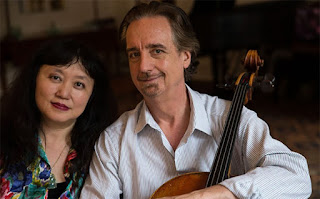Schubert at the summit: Piano-violin-cello trios get peak performances at the Palladium
Sunday's concert in the outsized magnificence of Carmel's Palladium needs no special pleading. There's an aura around Franz Schubert's chamber music that seems unlikely ever to fade. And the fact that the
 |
| Wu Han and David Finckel have a decades-old partnerhsip |
performers of the two piano trios yesterday are illustrious in their fields, separately and together, promised great things.
Commentary on this repertoire tends toward gushing enthusiasm. Of such works, the English critic William Mann wrote: "They are music to be loved, and they inspire an affection that in human affairs we accord to our closest relations and to those friends from whose company we are never long absent."
So, if you weren't there Sunday evening at the Center for the Performing Arts, you'll have to be content with hugging those near and dear to you, even virtually. And if you were, you probably found your beloveds all the more huggable after hearing three master instrumentalists play the Trio in B-flat, op. 99, and the Trio in E-flat, op. 100. As pianist Wu Han pointed out in oral program notes at the start, they are the products of Schubert's astonishing, productive twilight before his early death at 31, 194 years ago this month.
 |
| Benjamin Beilman is well-known here. |
Then she was joined onstage by cellist David Finckel, her husband and partner in a variety of artistic ventures, and violinist Benjamin Beilman, who is known to local audiences for his distinction as bronze medalist in the 2010 International Violin Competition of Indianapolis and subsequent concert appearances with the Chamber Music Society of Lincoln Center (2014) and as guest soloist with the Indianapolis Symphony Orchestra (2018 and 2021) and the Indianapolis Chamber Orchestra (2016).
The two works are contrasted inherently by an emotional palette that Wu Han summed up as "joyful" (op. 99) and "declaration" (op. 100). Immediately the technical aplomb and mutual fellow-feeling of this ensemble came into play. Never forcing the tone or permitting gentler episodes to turn wispy, the string players seemed to revel in the pristine acoustical environment, and the flowing yet continually demanding writing for piano rolled out naturally from the keyboard.
Schubert's gifts as a melodist, perhaps supreme in the canon, were always presented in a manner that confirmed the complementary layout of both pieces. The love song introduced by the cello in op. 99's Andante un poco mosso was confirmed later on by the violin. As elaborate as Schubert becomes in his typically luxuriant workmanship, this trio was ready to address it on common ground.
In op. 100, where Schumann's enduring praise for his predecessor's "heavenly lengths" comes to mind in the finale, the audience was surely more inclined to feel the heavenly quality than the length. The relentless tapestry in the piano part recalls the famously thorny accompaniment to the song "Der Erlkönig," a work further along the dark end of the spectrum than this trio. That solemn mood is definitively established by the tune the cello introduces in the second movement to the funeral-march beat of the other two players. When that melody recurs in the finale, it's obvious the mortally ill composer was gazing into the valley of the shadow of death.
Elsewhere, even in this music focused on declaration, changes of mood typical of the composer were adroitly managed, especially in the first movement. A premium is put upon articulation throughout both works, and here Wu Han, Finckel and Beilman were unfailingly alert and expressive. Even with pauses and frequent staccato, the crisp rhythmic profile never became choppy. Melody and mood remained uppermost.
In sesquicentennial observances in Detroit of Schubert's death in 1978, New Yorker critic Andrew Porter summed up the degree to which scholars had shed light on the mystery of the composer's personal life. Most of the clarity, Porter demonstrated, corrected the old image of Schubert as a feckless amateur of great talent and productivity, scrawling songs on napkins, whose professional seriousness had to be called into question.
Up to the present time, as the newer image becomes established, Schubert's life and work are a parable of the tenuousness of a creative artist's life. The puzzles of making a public impact have existed from that day to this, with the permanent decline of aristocratic patronage and today's vagaries of digitized publicity.
No composer has established a posthumous niche more definitively than Schubert, and performances like this one add luster to his immortality. Oh, and they also spread the love, as William Mann observed.



Comments
Post a Comment